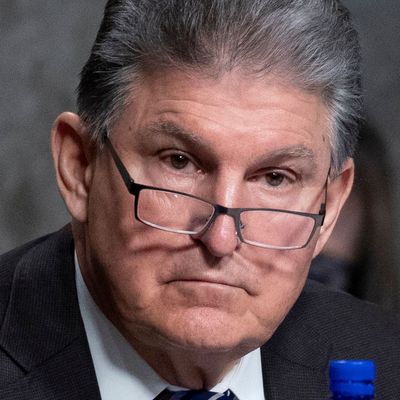
On the national emergency facing voting rights, as on so much else, West Virginia senator Joe Manchin is in the catbird seat. His willingness to enact the COVID-19 relief and stimulus bill on a party-line vote via the budget reconciliation process made that Democratic success story possible. His unwillingness to countenance serious reform of the Senate filibuster on legislation that cannot be included in a reconciliation bill has become a potential bar to a lot of other Democratic priorities.
Now that the Senate has taken up the For the People Act package of voting-rights legislation (known as H.R.1 in the House and S.1 in the Senate), Manchin’s position is again front and center, in part because he is the only Democratic senator who is not already co-sponsoring S.1, and in part because there is no evident Republican support for much of anything in the legislation. Additionally, as Ron Brownstein has so forcefully argued, preempting the restrictive voting provisions Republicans are promoting at the state level could be a condition precedent to Democratic electoral success as far as the eye can see. It has become the partisan issue par excellence, and perhaps the clearest example of the need for a filibuster carve out, like the ones that earlier provided for majority-vote approval of judicial and executive nominees.
Today Manchin put out a statement on S.1, and it’s not encouraging for voting-rights advocates or for Democrats generally:
His consistent theme is that bipartisanship is essential in any regulation of federal elections “to restore faith and trust in our democracy.” This is a pretty clear indication of sympathy with the GOP’s claim that all the voter-suppression efforts underway in Republican-controlled states are justified by the fact that Republican voters are buying into lies about the 2020 elections. Presumably, partisan voting-rights legislation — the only kind with a prayer of enactment in Congress — will make that lack of “faith and trust” even worse.
Manchin cites a few minor provisions in S.1 as “bipartisan,” and thus capable of enactment. And he goes on to specifically support one provision (mandating early in-person voting opportunities) that Republicans typically reject. He does not address a host of major topics covered in S.1, including gerrymandering reform, voter-registration improvements, voting-by-mail guarantees, ex-felon enfranchisement, voter-purge prevention, and public financing of congressional elections, among others. Presumably Manchin’s early-voting endorsement means he thinks some federal preemption of state voting procedures for federal elections is appropriate. But on the other hand, he goes out of his way to tout the “importance of local decision-making around voter accessibility and election security.”
You could interpret this statement as a death sentence for major federal voting-rights legislation this year, which would be a green light to additional voter-suppression measures at the state level. Or it’s possible Manchin is setting up a test for Republicans they are sure to fail. That’s the optimistic possibility Brownstein raises:
Another glass-is-not-empty take might be that Manchin did not specifically mention the John Lewis Voting Rights Advancement Act, a separate bill that would restore the VRA enforcement mechanisms the U.S. Supreme Court gutted in 2013. Earlier this week I suggested Manchin might be able to support that bill (which at least ought to be bipartisan, since it restores the VRA as it was when extensions were routinely passed with much Republican support), up to and including the point where it might have to be imposed on the Senate via a filibuster carve out. His statement did not, at least, rule that out.
One signal to look for is whether Senate Republicans view Manchin’s statement as obliging them to look for a bipartisan set of federal election rules, or simply gloat that the “Democrat power grab” of S.1 has been blocked — which again, would simply mean that Republican state officials would be free to run wild without interference from Washington. If, as is most likely, Manchin’s plea for bipartisanship is greeted happily by the GOP as the death knell for federally enacted voting rights altogether, then the West Virginian should understand the game is up and start acting like a Democrat again.






























